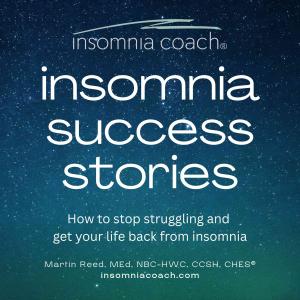Insomnia Coach® Podcast

How Jake got his sleep back on track by changing his nighttime behaviors and his daytime behaviors (#30)
Listen to the podcast episode (audio only) When COVID led to Jake having to work from home he found himself working way beyond the usual nine to five. Jake found himself answering calls and texts at all hours of the day and even started to take his computer to bed. Work soon encroached into his weekends and before long, Jake found that he no longer had any kind of sleep schedule. When he took a vacation he found it really hard to get any sleep at all and this led to a lot of sleep-related research, a lot of anxiety, and a lot of worry. Fortunately, Jake's sleep recovered — but only for a few weeks. Then, his insomnia returned and was even worse than before. Jake thought that his sleep was broken and that something was wrong with him. The good news is, there's no real mystery when it comes to insomnia — from person to person, insomnia is remarkably similar. It's often our relationship with our thoughts and the behaviors we might implement in a bid to improve our sleep that provide insomnia with the oxygen it needs to survive. As Jake learned more about sleep and insomnia he implemented evidence-based techniques to help build sleep drive, strengthen his body clock, and weaken arousal. He started to spend less time in bed, he got out of bed during the night if being in bed didn't feel good, and — perhaps most importantly of all — he tried to live the kind of life he wanted to live during the day, independently of how he slept. Now, Jake's life doesn't revolve around sleep and he no longer tries to control sleep or put effort into sleep. As a result, he is sleeping a lot better and has regained confidence in his natural ability to sleep. Click here for a full transcript of this episode.Click here to hide the transcript. Martin Reed: Welcome to the Insomnia Coach Podcast. My name is Martin Reed. I believe that nobody needs to live with chronic insomnia and that evidence-based cognitive and behavioral techniques can help you enjoy better sleep for the rest of your life. Martin Reed: The content of this podcast is provided for informational and educational purposes only. It is not medical advice and is not intended to diagnose, treat, cure, or prevent any disease, disorder, or medical condition. It should never replace any advice given to you by your physician or any other licensed healthcare provider. Insomnia Coach LLC offers coaching services only and does not provide therapy, counseling, medical advice, or medical treatment. The statements and opinions expressed by guests are their own and are not necessarily endorsed by Insomnia Coach LLC. All content is provided "as is" and without warranties, either express or implied. Martin Reed: Hi, Jake, thank you for taking the time out of your day to come on to the podcast. Jake Zandi: Oh, thanks for having me, Martin. I'm very happy to be here today. Martin Reed: It's great to have you on. Let's start right at the beginning. When did your sleep problems first begin and what do you think caused your initial issues with sleep? Jake Zandi: Well, so we've all been going through this pandemic for the past, I think it's over a year now since it's hit the States. Yeah, I was doing pretty good with work and everything like that, working at an actual physical location. Once the pandemic hit, I think it was like in March of last year, I was told to go home. I actually just started the job probably two weeks prior to that. So, I had never really worked from home before and that's something I've never really had to do. So, I didn't really know, at first, I didn't really have the discipline, you know what I mean? Of working just nine to five like my old job was. Jake Zandi: So, I got caught in,






 Visit Podcast Website
Visit Podcast Website RSS Podcast Feed
RSS Podcast Feed Subscribe
Subscribe
 Add to MyCast
Add to MyCast